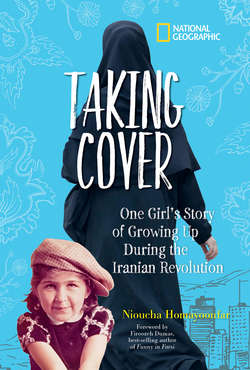Читать книгу Taking Cover: One Girl's Story of Growing Up During the Iranian Revolution - National Kids Geographic - Страница 7
FOREWORD BY FIROOZEH DUMAS, BEST-SELLING AUTHOR OF FUNNY IN FARSI
ОглавлениеHigh school was a pivotal time in my life, not for anything that happened at school, but for what happened on the other side of the world. Many evenings during my freshman year, I took my place on the sofa next to my parents as we watched the Iranian revolution unfold on the evening news. We lived in California, far away from the actual events, but we thought and spoke of nothing else. Still, if a fortune-teller had told us what the future held for Iran, we would have laughed in his face.
The Iran that we knew was a country with a cosmopolitan capital where women tried to emulate the latest European fashions, where the population was mostly secular, and where Jews, Christians, and Muslims co-existed peacefully. Women were making advancements in many fields, Iranian schools were producing world-renowned engineers and doctors, and more citizens than ever had access to educational opportunities.
Before 1979, most Iranians did not fathom that someday, women would no longer be allowed to serve as judges, that Western music would be banned, that women would be punished for showing strands of hair, that what happens socially in the privacy of your home, like dancing, could actually get you arrested. I still cannot believe that my favorite vacation spot as a child, the Caspian Sea, is now gender-segregated. How ridiculous is it that men and women can no longer enjoy the beach together?
Of course pre-revolutionary Iran had some very serious problems. We knew the shah’s government was corrupt and knew the profit from oil, the country’s main natural resource, did not go back to the people, but to the corrupt individuals with ties to the government. Members of the Bahá’í religion suffered for their beliefs. Iranians had little freedom of speech and the shah’s critics were silenced.
With the overthrow of the shah, we, like many Iranians, were cautiously optimistic. We hoped that a non-traditional leader, someone who was not a politician, would herald a new era for Iran, an era of democracy and economic fairness. Ironically the overthrowing of the shah did not solve Iran’s issues. The Iran of today has even more problems, and a society with far fewer rights.
Books like this, Nioucha Homayoonfar’s Taking Cover, provide such an important and necessary window into the complexities of this country. Told from the point of view of a young French-Iranian girl coming of age in Iran, her story shows the changes, both big and small, that slowly became a way of life, forming the Iran that exists today. Her simple observations effectively yet powerfully illustrate how the Iran that she knew, the Iran that I knew, disappeared, bit by bit. Her descriptions of the changes in her school alone speak volumes about the opportunities afforded to Iran’s youth before and after the revolution and why so many Iranians now live in exile. More important, her story shows us why those of us living in exile continue to love our culture and our people, why we do our best to hang on to our memories, our language, our music, and our recipes.
Nioucha’s colorful story will inevitably surprise many readers who do not visualize pre-revolutionary Tehran as a vibrant and international city, a city where John Travolta’s dance moves were attempted by every teen with Saturday night fever and where the search for the latest and trendiest American tennis shoes was a serious venture. But there is an even more important reason to read Taking Cover. Even though readers will be entertained by Nioucha’s memoir, I hope they will also ponder the vital underlying question: Can my freedoms be taken away? Does radical change always require a violent revolution or can rights be taken away slowly and silently?
I hope Nioucha’s book will be discussed in schools, at home, and in book clubs across America. As Coretta Scott King so affectingly said, “Freedom is never really won. You earn it and win it in every generation.”
—Firoozeh Dumas
Firoozeh Dumas is the author of the New York Times best sellers Funny in Farsi and Laughing Without an Accent, and the award-winning It Ain’t So Awful, Falafel. She has also written articles for the New York Times, covering topics on her life as an Iranian-born woman raised in America. For more information, visit firoozehdumas.com.
